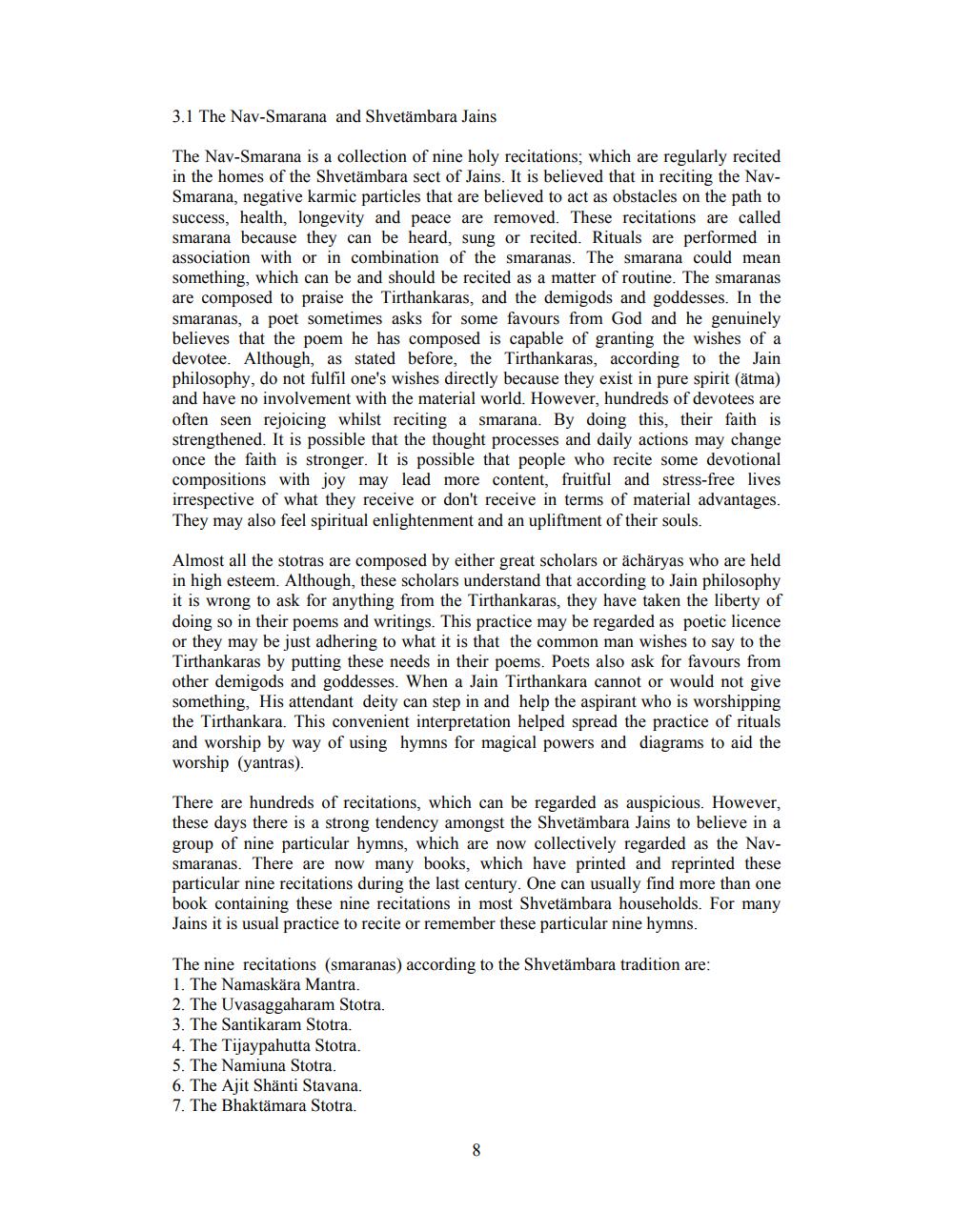Book Title: Nav Smarana Author(s): Vinod Kapashi Publisher: Vinod Kapashi View full book textPage 8
________________ 3.1 The Nav-Smarana and Shvetämbara Jains The Nav-Smarana is a collection of nine holy recitations; which are regularly recited in the homes of the Shvetämbara sect of Jains. It is believed that in reciting the NavSmarana, negative karmic particles that are believed to act as obstacles on the path to success, health, longevity and peace are removed. These recitations are called smarana because they can be heard, sung or recited. Rituals are performed in association with or in combination of the smaranas. The smarana could mean something, which can be and should be recited as a matter of routine. The smaranas are composed to praise the Tirthankaras, and the demigods and goddesses. In the smaranas, a poet sometimes asks for some favours from God and he genuinely believes that the poem he has composed is capable of granting the wishes of a devotee. Although, as stated before, the Tirthankaras, according to the Jain philosophy, do not fulfil one's wishes directly because they exist in pure spirit (ätma) and have no involvement with the material world. However, hundreds of devotees are often seen rejoicing whilst reciting a smarana. By doing this, their faith is strengthened. It is possible that the thought processes and daily actions may change once the faith is stronger. It is possible that people who recite some devotional compositions with joy may lead more content, fruitful and stress-free lives irrespective of what they receive or don't receive in terms of material advantages. They may also feel spiritual enlightenment and an upliftment of their souls. Almost all the stotras are composed by either great scholars or ächäryas who are held in high esteem. Although, these scholars understand that according to Jain philosophy it is wrong to ask for anything from the Tirthankaras, they have taken the liberty of doing so in their poems and writings. This practice may be regarded as poetic licence or they may be just adhering to what it is that the common man wishes to say to the Tirthankaras by putting these needs in their poems. Poets also ask for favours from other demigods and goddesses. When a Jain Tirthankara cannot or would not give something, His attendant deity can step in and help the aspirant who is worshipping the Tirthankara. This convenient interpretation helped spread the practice of rituals and worship by way of using hymns for magical powers and diagrams to aid the worship (yantras). There are hundreds of recitations, which can be regarded as auspicious. However, these days there is a strong tendency amongst the Shvetämbara Jains to believe in a group of nine particular hymns, which are now collectively regarded as the Navsmaranas. There are now many books, which have printed and reprinted these particular nine recitations during the last century. One can usually find more than one book containing these nine recitations in most Shvetämbara households. For many Jains it is usual practice to recite or remember these particular nine hymns. The nine recitations (smaranas) according to the Shvetämbara tradition are: 1. The Namaskara Mantra. 2. The Uvasaggaharam Stotra 3. The Santikaram Stotra. 4. The Tijaypahutta Stotra. 5. The Namiuna Stotra. 6. The Ajit Shänti Stavana. 7. The Bhaktämara Stotra. 8Page Navigation
1 ... 6 7 8 9 10 11 12 13 14 15 16 17 18 19 20 21 22 23 24 25 26 27 28 29 30 31 32 33 34 35 36 37 38 39 40 41 42 43 44 45 46 47 48 49 50 51 52 53 54 55 56 57 58 59 60 61 62 63 64 65 66 67 68 69 70 71 72 73 74 75 76 77 78 79 80 81 82 ... 224
